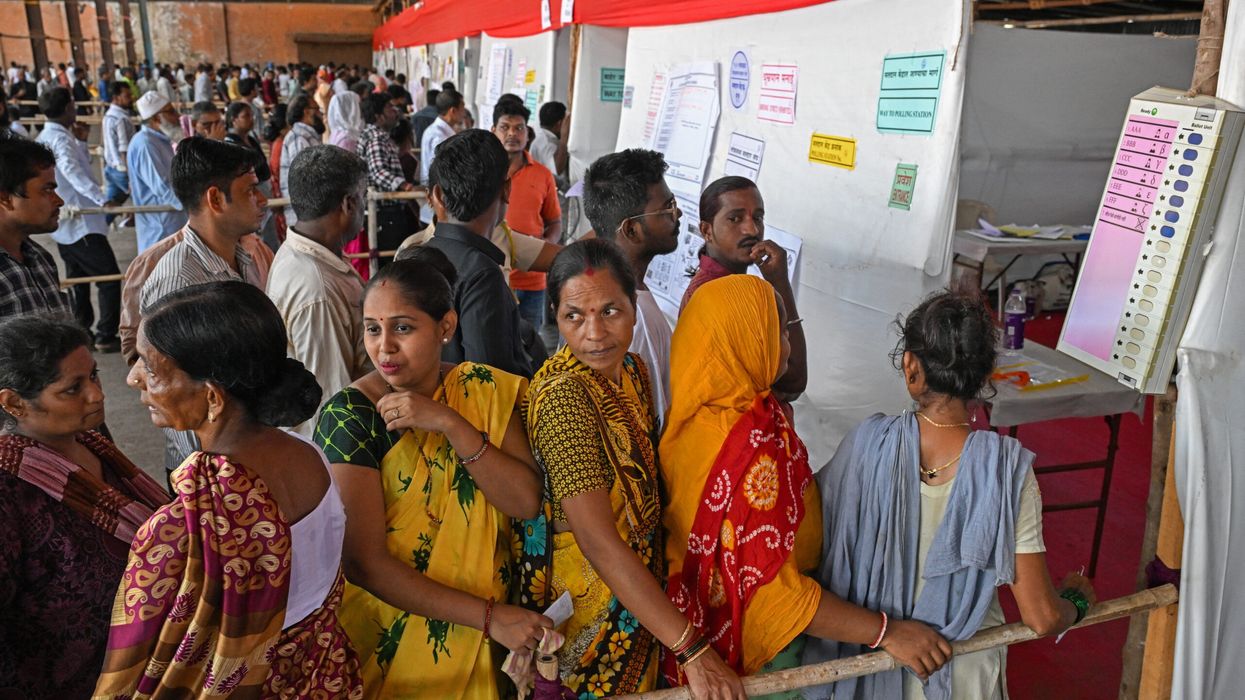On Monday, over 60 per cent voter turnout was recorded in 49 constituencies across six states and two Union territories during the fifth phase of India’s elections.
Baramulla in Jammu and Kashmir registered its highest-ever voting percentage.
Scattered incidents of violence occurred in West Bengal, with electronic voting machine (EVM) glitches and complaints of slow voting in Maharashtra.
West Bengal had the highest polling percentage at 76.05, while Maharashtra had the lowest at 54.33 per cent. Six Lok Sabha constituencies in Mumbai saw voting percentages between 47 per cent and 55 per cent. Thane recorded a turnout of 49.81 per cent, according to the Election Commission of India's (ECI) voter turnout app at midnight.
The EC noted that urban areas like Mumbai, Thane, Nashik, and Lucknow continued to show low voter turnout, similar to the 2019 general elections. Jammu and Kashmir's Baramulla Lok Sabha constituency, once militancy-infested, recorded its highest-ever voter turnout at 59 per cent, said J-K chief electoral officer PK Pole. The Sopore assembly segment saw a 44 per cent turnout after years of single-digit percentages.
"The Baramulla Lok Sabha constituency witnessed a record voter turnout since parliamentary polls were first held here in 1967," Pole stated. The previous highest turnout in Baramulla was 58.90 per cent in 1984. Former J-K chief minister Omar Abdullah is among 22 candidates contesting for the seat.
Other states saw the following turnouts: Bihar at 54.85 per cent, Jharkhand at 63.09 per cent, Odisha at 69.34 per cent, Uttar Pradesh at 57.79 per cent, and Ladakh at 69.62 per cent. These figures are approximate as data is still being collated, the EC said. The overall turnout for the fifth phase was 60.48 per cent according to the EC's app.
The last four phases had a total voter turnout of 66.95 per cent. With the fifth phase completed, voting has concluded in 25 states and Union Territories and 428 constituencies out of 543. Two more phases remain, scheduled for May 25 and June 1, with vote counting on June 4.
Violence was reported in seven parliamentary constituencies of West Bengal, where TMC and BJP workers clashed in Barrackpore, Bongaon, and Arambagh. By 4.30 pm, the state CEO's office received 1,913 complaints, including EVM malfunctions and polling agents being blocked from entering booths.
Clashes occurred between TMC and BJP supporters in Khanakul in Arambagh constituency. In Howrah, the BJP accused TMC workers of "booth jamming," leading to clashes that were dispersed by central police forces. In Bongaon’s Gayeshpur area, local BJP leader Subir Biswas was allegedly beaten by TMC supporters and hospitalised.
In Kalyani, minister and BJP candidate Shantanu Thakur caught a person using the identity card of his rival TMC candidate inside a polling booth. The person was removed by central forces. TMC workers protested in some areas, alleging central forces were assisting BJP workers in "intimidating" voters at Hooghly booths.
In Uttar Pradesh, Amethi recorded a voter turnout of 54.15 per cent, Lucknow 52.03 per cent, and Rae Bareli 57.85 per cent. "There was no violence anywhere in the state. About 250 complaints regarding slow voting and EVMs were received," said Uttar Pradesh chief electoral officer Navdeep Rinwa. Three booths in Jhansi constituency in Lalitpur district reported 100 per cent polling.
Congress leader Rahul Gandhi, contesting from Rae Bareli, visited various polling booths, interacted with local residents, and visited a Hanuman temple. Defence minister Rajnath Singh (Lucknow), minister for women and child development Smriti Irani (Amethi), and other prominent candidates cast their votes.
In Maharashtra, Mumbai residents faced delays, slow voting, and long queues. Shiv Sena (UBT) chief Uddhav Thackeray accused the EC of deliberately delaying the poll process at the behest of the Modi government. Maharashtra deputy chief minister Devendra Fadnavis countered, saying he first complained about the slow voting pace.
BJP leader Kirit Somaiya alleged that Shiv Sena (UBT) leaders were involved in corrupt practices. However, MLA Sunil Raut denied the allegations, stating a dummy EVM was kept for educational purposes outside the 100-meter radius of the polling booth, which police removed.
Prominent personalities from various sectors voted in Mumbai and Thane. A 56-year-old election officer died of a heart attack at a polling booth in Mumbai South Lok Sabha constituency.
In Odisha, an auto-rickshaw driver was killed near a polling booth, which family members claimed was a political murder, but officials attributed to personal enmity. EVM glitches were also reported in some places. In Kandhamal, voting at a booth was halted due to disturbances, and a presiding officer was taken into custody for irregularities.
Jharkhand saw a voter turnout of 63 per cent. In the Gandey assembly bypoll, 68.26 per cent turnout was recorded. Seven FIRs were registered for model code of conduct violations.
Over 8.95 crore people were eligible to vote in this phase, with 9.47 lakh polling officials deployed across 94,732 polling stations. The turnout percentages for the previous phases were 66.14, 66.71, 65.68, and 69.16 per cent. Final turnout will be available after counting postal ballots.





